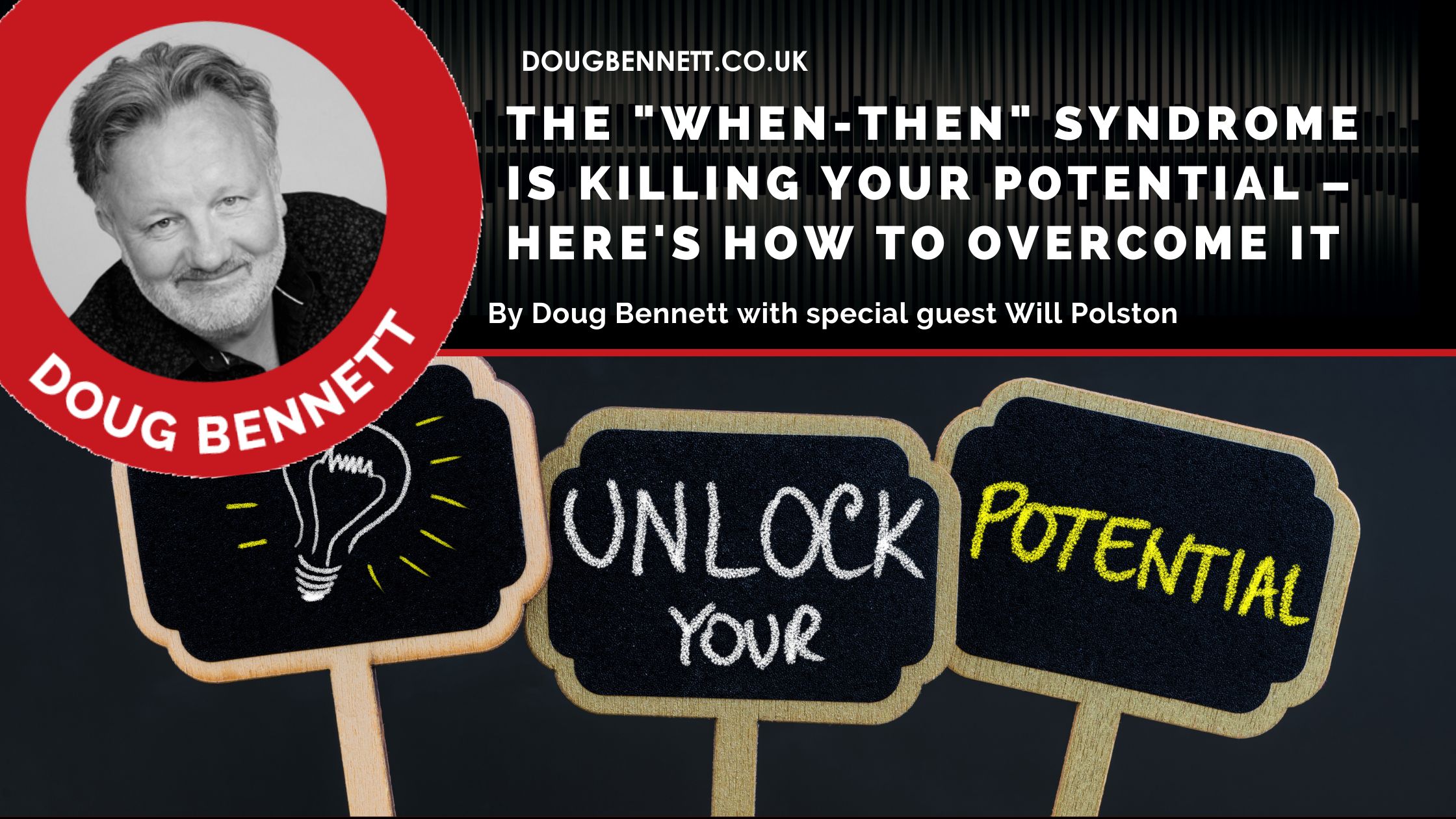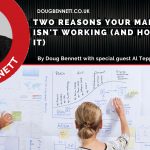The “When-Then” Syndrome Is Killing Your Potential – Here’s How To Overcome It

By Doug Bennett with special guest Will Polston
Does achieving one big goal lead to long-term happiness? For instance, if you spent your entire life chasing after money, would you be happier when you could finally afford the finer things?
The answer to this question might be more disappointing than you think.
Recently, on the Goals Do Come True podcast, I was joined by Will Polston, a bestselling author, entrepreneur, and performance coach. As a young man, Will was determined to acquire wealth and eventually find fulfilment.
But after becoming a successful yet unfulfilled broker, he realised there was something holding him back from reaching his full potential, which he calls the “when-then” syndrome. Today, he’s found his “North Star” and now empowers ambitious individuals to master their mindset and live a life they love.
You can listen to our full conversation by clicking here.
In this blog, we’ll take a closer look at Will’s personal journey, how he overcame the “when-then” syndrome, and how you, too, can shift your mindset.
What is the “when-then” syndrome?
It’s almost second nature for many of us to link our happiness to one big goal. We say to ourselves, “I’ll finally be happy when I achieve XYZ” or, “I’ll feel fulfilled when I finally sell off my business.”
But, as is often the case, the elation that comes with achieving these goals lasts for only a few moments. We then resume the endless cycle of chasing after the next goal, hoping that it’ll bring us fulfilment.
While it’s important to set these big, hairy, audacious goals, linking them to long-term happiness only prevents you from seeing the bigger picture and reaching your full potential.
I wanted to find out more about how this mindset takes root in our lives and how we can overcome it.
The formative years
Our mindset is often shaped by the things we experience during our formative years. In many cases, we fall victim to the “when-then” syndrome when we view fulfilment through the lens of other people’s lives.
As a young child, Will watched his father go through intense stress and depression as a result of his job. This led him to (wrongfully) conclude that his purpose and happiness were both linked to wealth.
Will: “I grew up with the belief that money will bring happiness, and I went on a tangent to make as much money as I could as early as possible. But that belief actually stemmed from my dad. He hated his job, and he used to be so stressed and frustrated. On the other hand, I had two wealthy uncles – one was a multi-millionaire, the other a billionaire – and they both seemed very happy. And that was when I connected the dots.
It seemed obvious to me that money was happiness. So, I went off on that tangent for many years. I focused on personal development, and the more I developed myself, the more money I made.”
While I was fascinated by how Will’s childhood experience shaped his ambition, I wanted to know how he made the switch and found his real drive.
Understanding the “when-then” syndrome
Will: “ In 2013, I had my lightning moment, and I broke down in tears. I realised that my real drive had nothing to do with money – it had never really been about money. It was about my dad: how he hadn’t achieved certain things he was capable of, and the impact that had on my family. So, from that moment, I became obsessed with enabling people to reach their full potential.
A lot of people get caught up in an endless cycle. They think, ‘When I achieve this, then I’ll be okay. When I get that, then I’ll be complete.’ And it’s ridiculous. Because even if you achieve the goal that you want, the happiness lasts for only a couple of minutes, and then you’re on the hunt again, falling into depletion.”
It’s easy to want to seek fulfilment in a single big, hairy, audacious goal. But unless you’ve found your true purpose, you’ll find yourself on a hamster wheel – chasing elusive bursts of happiness for the rest of your life rather than real contentment. Unfortunately, too many people fail to understand this until it’s much too late. They end up feeling depleted without ever achieving their full potential.
That’s why it’s so important to master your mindset and take a different tack to how you approach your goals.
If you feel like you’re struggling to shift your mindset and find your purpose, Will’s next nugget is incredibly eye-opening.
How to shift your mindset and create your North Star
Will: “A lot of people want to find their purpose, but I don’t believe in finding it. I believe in CREATING your purpose. This all boils down to getting clear and strategically creating your North Star. I used to be intrigued by the famous story of three wise men following the North Star to find a baby born in Bethlehem. What’s interesting is that they never actually went to the North Star. They only used it as a guiding light.
And so I thought to myself, what if we all just had this mission in life – this North Star – that we work towards every day? But the mission is so big we could never achieve it. It’s the equivalent of trying to empty the sea with a spoon. What would happen then?
By having that [an unattainable goal] as a focus point, you can detach from the outcome and focus on the process. And then, every single day becomes an opportunity to expand the work you’re doing. So it’s no longer about, ‘I’m this far away [from fulfilment]’. It’s now about, ‘I’m doing more today than I did yesterday.”
Will’s advice is clear for anyone seeking to build a life they love. While setting and achieving big, hairy, audacious goals can improve your happiness, it’s not the ultimate key to fulfilment. Fulfilment is a journey, not a destination, and the best way to create it is by focusing on the small, daily doses of progress.
Has this blog inspired you to shift your mindset? What else is stopping you from living a truly fulfilling life?
I’d love to hear about it! Drop me a line at doug@dougbennett.co.uk. And if you’d love an accountability group with free access to a weekly dose of inspiration, join The Wealth Tribe today.




